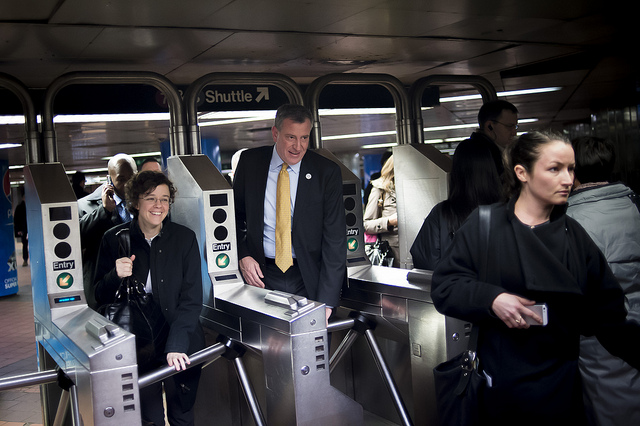With Governor Cuomo's long-awaited Fix NYC recommendations [PDF] dominating today's news cycle, Mayor de Blasio has softened his tone on congestion pricing. The mayor's remarks on WNYC this morning suggest a congestion pricing plan would be in play at City Hall, but it will have to be protected from death by a thousand exemptions.
On Brian Lehrer, de Blasio continued to plug his millionaires tax -- which would do nothing to reduce traffic -- as a superior MTA funding mechanism to congestion pricing. But he called the Fix NYC proposal an "improvement over previous plans."
De Blasio also said there should be consistent policy governing taxis, Uber, and similar services, and that the plan should reduce the mileage of for-hire vehicles traveling with no passengers. The Fix NYC plan sets out do just that.
On his wish list, de Blasio said the legislature should consider accommodations for "hardship cases," like people who drive into Manhattan for medical appointments.
The Fix NYC report does say that care should be taken not to impose undue hardship on poor residents, while pointing out that there are very, very few low-income motorists who would be hurt by a Manhattan pricing cordon. From the Times:
The report dismissed those claims, saying only 4 percent of residents of other boroughs commute to jobs in Manhattan in a vehicle, or approximately 118,000 residents. Of those, it said, more than half were higher income individuals, and fewer than 5,000 of them would qualify as working poor.
The impulse to carve out wide exemptions, as opposed to precisely-targeted discounts for people in genuine need, will have to be guarded against as the plan goes through the legislative process. When a Manhattan resident called in to WNYC asking for a blanket exemption for people who live in the cordon zone -- one of the wealthiest districts in the city -- de Blasio didn't rule it out.
Examples from other cities show that carving out exceptions for subsets of motorists is a recipe for an ineffective plan.
In Stockholm, congestion pricing has few exemptions, and the city has seen consistent results from its fee for more than a decade. Because the fee does what it promised, it is still exceedingly popular.
London, meanwhile, has a menu of exemptions and discounts, including taxis and residents of the charging zone. "Unfortunately, the shift to exempt traffic has diluted the scheme’s effectiveness," writes road pricing researcher Lewis Lehe. Lehe notes that London traffic would be worse without pricing -- at least 20 percent slower, according to Charles Komanoff -- but the carve-outs make the congestion charge less effective.
Cuomo's proposal is a solid start. It remains to be seen whether he'll use his bully pulpit to push the plan through and, just as important, prevent it from being watered down.






